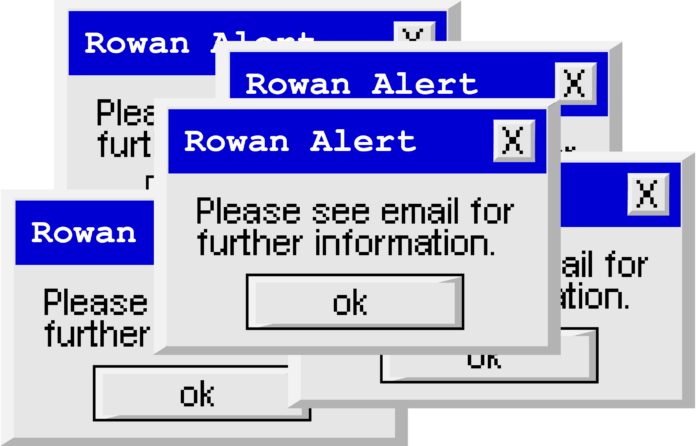
Within the first 25 days of the fall semester classes at Rowan, the public safety department’s crime log recorded 62 individual cases of crime occurring on the campus. These cases are filtered through several different people, from those witnessing the crime to the 911 dispatchers in place to receive calls regarding the crime and the emergency teams sent to respond.
Although this isn’t a particularly shocking statistic in comparison to other university’s September crime logs, such as Rutgers University or The College of New Jersey, it is the first time Rowan has operated at total capacity since the COVID-19 pandemic began— for all students, professors and public safety employees. Therefore, campus crime rates have returned to normal but are being perceived as high in comparison.
With the return of average crime levels to the Rowan University’s Glassboro campus came the return of the Rowan Alert system sending notifications to everyone’s phone, appearing in everyone’s emails and causing general confusion amongst students and teachers.
The first alert of the academic year came the weekend of Sept. 10— the first official weekend that all students were on campus.
The alert, which was sent to all Rowan-registered emails, read, “Rowan Alert.. Shots fired investigation. Please stay inside your residence. Glassboro Police Department investigating shots fired in the area of Dickinson RD/ Princeton RD. Anyone with information please dial 911 or Rowan Public Safety 856 256 4922.”
The Rowan Alert email, which was preceded by several Rowan Alert texts saying the same thing, was sent to students at 2:27 a.m; when many students were at parties or with friends. The lack of information, compounded with the timing of the alert sent many students scrambling for information.
“The issue is that we’re just constrained legally on what we can share. And people get frustrated about that,” said Joe Cardona, Ed.D., the vice president for university relations and university spokesperson.
And Cardona is right. Students and faculty are frustrated, and there is almost nothing the university can do about it.
The Rowan Alert System is like one of many found at every university across the country, thanks to The Clery Act. The Clery Act was established in 1986 after the parents of Jeanne Clery fought for transparent, accurate and timely information on campus following the murder of their daughter in her campus dorm room.
“There are dispatchers that monitor and receive all phone calls and they are the ones that dispatch police to the scene,” Cardona said. “So, they’re the ones that send the first alert notice. The first ‘hey, this happened.’”
Because dispatchers are not only responsible for notifying first responders, but also reporting the event through the Rowan Alert system, they use one of many. Cardona described as roughly three dozen— pre-made templates where they need only change the date, time, and location in order to send a quick, Clery Act-compliant message to the Rowan community.
It is the opinion of The Whit that while we as students would prefer accurate, timely, and detailed information about crime on our campus. However, we recognize that it is unlikely because the people responsible for these alerts are already under such an intense time constraint.
According to the U.S. Bureau of Labor Statistics Standard Occupation Classification System, 911 operators are classified as no more than “Office and Administrative Support Occupations.” But at Rowan University, they operate two of the most crucial notification systems to alert police and fire in the event of an emergency, as well as notify the student body of crucial information regarding their safety.
These individuals— who, nationally, answer 240 million calls per year according to the Vera Institute of Justice— have shifts that include evenings, weekends and holidays in order to provide constant aid to their communities. And send us a text when the Robinson Hall elevator is out of service.
It is the opinion of The Whit that Rowan Alerts need to be timely and contain more detail. But it is also our position that it is unrealistic to ask for so much from a position that is already given so little.
Instead, the Rowan Alert System needs to be reorganized so that the burden of these alerts isn’t placed on a group of already overworked individuals. Rowan University needs to take initiative to improve this system and place its responsibility of it onto a person who is solely responsible for its success.
In its present condition, 911 dispatchers are so concerned with dispatching emergency services– which is their job– that they don’t have the time to curate a detailed message to students. Because of course, they don’t.
“We really give a lot of information,” Cardona said. “We know that every time we send out a message, it’s a trigger for people… We don’t have more information about that. We’re just keeping everyone up to date.”
For comments/questions about this story, email the.whit.rowan@gmail.com or tweet @TheWhitOnline.





